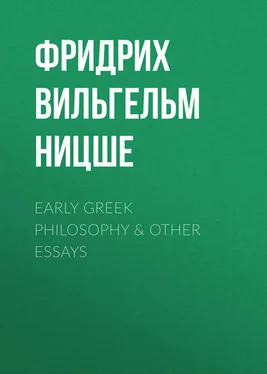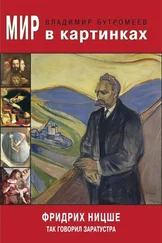Фридрих Ницше - Early Greek Philosophy & Other Essays
Здесь есть возможность читать онлайн «Фридрих Ницше - Early Greek Philosophy & Other Essays» — ознакомительный отрывок электронной книги совершенно бесплатно, а после прочтения отрывка купить полную версию. В некоторых случаях можно слушать аудио, скачать через торрент в формате fb2 и присутствует краткое содержание. Жанр: Философия, literature_19, foreign_antique, foreign_prose, на английском языке. Описание произведения, (предисловие) а так же отзывы посетителей доступны на портале библиотеки ЛибКат.
- Название:Early Greek Philosophy & Other Essays
- Автор:
- Жанр:
- Год:неизвестен
- ISBN:нет данных
- Рейтинг книги:3 / 5. Голосов: 1
-
Избранное:Добавить в избранное
- Отзывы:
-
Ваша оценка:
- 60
- 1
- 2
- 3
- 4
- 5
Early Greek Philosophy & Other Essays: краткое содержание, описание и аннотация
Предлагаем к чтению аннотацию, описание, краткое содержание или предисловие (зависит от того, что написал сам автор книги «Early Greek Philosophy & Other Essays»). Если вы не нашли необходимую информацию о книге — напишите в комментариях, мы постараемся отыскать её.
Early Greek Philosophy & Other Essays — читать онлайн ознакомительный отрывок
Ниже представлен текст книги, разбитый по страницам. Система сохранения места последней прочитанной страницы, позволяет с удобством читать онлайн бесплатно книгу «Early Greek Philosophy & Other Essays», без необходимости каждый раз заново искать на чём Вы остановились. Поставьте закладку, и сможете в любой момент перейти на страницу, на которой закончили чтение.
Интервал:
Закладка:
One must not think any the worse of us for considering from this point of view one item so that we may speak about it without reserve, namely the last movement of Beethoven's Ninth Symphony, a movement which is unprecedented and unanalysable in its charms. To the dithyrambic world-redeeming exultation of this music Schiller's poem "To Joy," is wholly incongruous, yea, like cold moon-light, pales beside that sea of flame. Who would rob me of this sure feeling? Yea, who would be able to dispute that that feeling during the hearing of this music does not find expression in a scream only because we, wholly impotent through music for metaphor and word, already hear nothing at all from Schiller's poem. All that noble sublimity, yea the grandeur of Schiller's verses has, beside the truly naïve-innocent folk-melody of joy, a disturbing, troubling, even crude and offensive effect; only the ever fuller development of the choir's song and the masses of the orchestra preventing us from hearing them, keep from us that sensation of incongruity. What therefore shall we think of that awful æsthetic superstition that Beethoven himself made a solemn statement as to his belief in the limits of absolute music, in that fourth movement of the Ninth Symphony, yea that he as it were with it unlocked the portals of a new art, within which music had been enabled to represent even metaphor and idea and whereby music had been opened to the "conscious mind." And what does Beethoven himself tell us when he has choir-song introduced by a recitative? "Alas friends, let us intonate not these tones but more pleasing and joyous ones!" More pleasing and joyous ones! For that he needed the convincing tone of the human voice, for that he needed the music of innocence in the folk-song. Not the word, but the "more pleasing" sound, not the idea but the most heartfelt joyful tone was chosen by the sublime master in his longing for the most soul-thrilling ensemble of his orchestra. And how could one misunderstand him! Rather may the same be said of this movement as Richard Wagner says of the great " Missa Solemnis " which he calls "a pure symphonic work of the most genuine Beethoven-spirit" (Beethoven, p. 42). "The voices are treated here quite in the sense of human instruments, in which sense Schopenhauer quite rightly wanted these human voices to be considered; the text underlying them is understood by us in these great Church compositions, not in its conceptual meaning, but it serves in the sense of the musical work of art, merely as material for vocal music and does not stand to our musically determined sensation in a disturbing position simply because it does not incite in us any rational conceptions but, as its ecclesiastical character conditions too, only touches us with the impression of well-known symbolic creeds." Besides I do not doubt that Beethoven, had he written the Tenth Symphony – of which drafts are still extant – would have composed just the Tenth Symphony.
Let us now approach, after these preparations, the discussion of the opera, so as to be able to proceed afterwards from the opera to its counterpart in the Greek tragedy. What we had to observe in the last movement of the Ninth, i. e., on the highest level of modern music-development, viz., that the word-content goes down unheard in the general sea of sound, is nothing isolated and peculiar, but the general and eternally valid norm in the vocal music of all times, the norm which alone is adequate to the origin of lyric song. The man in a state of Dionysean excitement has a listener just as little as the orgiastic crowd, a listener to whom he might have something to communicate, a listener as the epic narrator and generally speaking the Apollonian artist, to be sure, presupposes. It is rather in the nature of the Dionysean art, that it has no consideration for the listener: the inspired servant of Dionysos is, as I said in a former place, understood only by his compeers. But if we now imagine a listener at those endemic outbursts of Dionysean excitement then we shall have to prophesy for him a fate similar to that which Pentheus the discovered eavesdropper suffered, namely, to be torn to pieces by the Mænads. The lyric musician sings "as the bird sings," 1 1 A reference to Goethe's ballad, The Minstrel, st. 5: "I sing as sings the bird, whose note The leafy bough is heard on. The song that falters from my throat For me is ample guerdon." TR.
alone, out of innermost compulsion; when the listener comes to him with a demand he must become dumb. Therefore it would be altogether unnatural to ask from the lyric musician that one should also understand the text-words of his song, unnatural because here a demand is made by the listener, who has no right at all during the lyric outburst to claim anything. Now with the poetry of the great ancient lyric poets in your hand, put the question honestly to yourself whether they can have even thought of making themselves clear to the mass of the people standing around and listening, clear with their world of metaphors and thoughts; answer this serious question with a look at Pindar and the Æschylian choir songs. These most daring and obscure intricacies of thought, this whirl of metaphors, ever impetuously reproducing itself, this oracular tone of the whole, which we, without the diversion of music and orchestration, so often cannot penetrate even with the closest attention – was this whole world of miracles transparent as glass to the Greek crowd, yea, a metaphorical-conceptual interpretation of music? And with such mysteries of thought as are to be found in Pindar do you think the wonderful poet could have wished to elucidate the music already strikingly distinct? Should we here not be forced to an insight into the very nature of the lyricist – the artistic man, who to himself must interpret music through the symbolism of metaphors and emotions, but who has nothing to communicate to the listener; an artist who, in complete aloofness, even forgets those who stand eagerly listening near him. And as the lyricist his hymns, so the people sing the folk-song, for themselves, out of in-most impulse, unconcerned whether the word is comprehensible to him who does not join in the song. Let us think of our own experiences in the realm of higher art-music: what did we understand of the text of a Mass of Palestrina, of a Cantata of Bach, of an Oratorio of Händel, if we ourselves perhaps did not join in singing? Only for him who joins in singing do lyric poetry and vocal music exist; the listener stands before it as before absolute music.
But now the opera begins, according to the clearest testimonies, with the demand of the listener to understand the word.
What? The listener demands? The word is to be understood?
But to bring music into the service of a series of metaphors and conceptions, to use it as a means to an end, to the strengthening and elucidation of such conceptions and metaphors – such a peculiar presumption as is found in the concept of an "opera," reminds me of that ridiculous person who endeavours to lift himself up into the air with his own arms; that which this fool and which the opera according to that idea attempt are absolute impossibilities. That idea of the opera does not demand perhaps an abuse from music but – as I said – an impossibility. Music never can become a means; one may push, screw, torture it; as tone, as roll of the drum, in its crudest and simplest stages, it still defeats poetry and abases the latter to its reflection. The opera as a species of art according to that concept is therefore not only an aberration of music, but an erroneous conception of æsthetics. If I herewith, after all, justify the nature of the opera for æsthetics, I am of course far from justifying at the same time bad opera music or bad opera-verses. The worst music can still mean, as compared with the best poetry, the Dionysean world-subsoil, and the worst poetry can be mirror, image and reflection of this subsoil, if together with the best music: as certainly, namely, as the single tone against the metaphor is already Dionysean, and the single metaphor together with idea and word against music is already Apollonian. Yea, even bad music together with bad poetry can still inform as to the nature of music and poesy.
Читать дальшеИнтервал:
Закладка:
Похожие книги на «Early Greek Philosophy & Other Essays»
Представляем Вашему вниманию похожие книги на «Early Greek Philosophy & Other Essays» списком для выбора. Мы отобрали схожую по названию и смыслу литературу в надежде предоставить читателям больше вариантов отыскать новые, интересные, ещё непрочитанные произведения.
Обсуждение, отзывы о книге «Early Greek Philosophy & Other Essays» и просто собственные мнения читателей. Оставьте ваши комментарии, напишите, что Вы думаете о произведении, его смысле или главных героях. Укажите что конкретно понравилось, а что нет, и почему Вы так считаете.


![Фридрих Ницше - Песни Заратустры [сборник]](/books/28216/fridrih-nicshe-pesni-zaratustry-sbornik-thumb.webp)








